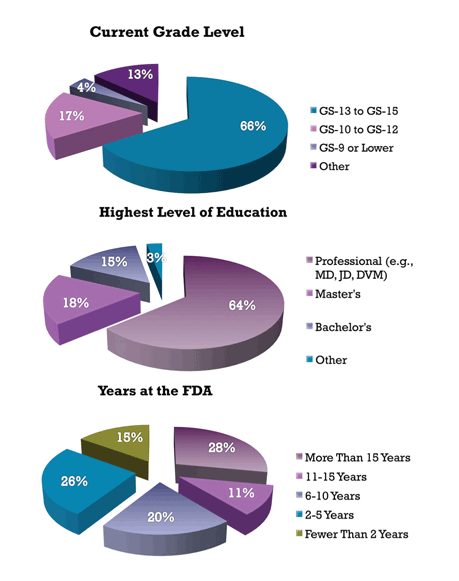A Union of Concerned Scientists survey gives regulatory scientists a voice.
FDA’S SCIENTISTS SAY POLITICAL INFLUENCE ‘TOO HIGH’
Scientists at the FDA feel that despite the agency’s attempts to improve scientific integrity, several areas are still lacking, according to a 33-question survey conducted by the Union of Concerned Scientists (UCS).
A total of 997 FDA scientists responded to the survey, with 30% saying that they felt political interests had “a lot of weight in the FDA’s final decisions” and 55% believing that such influence was “too high.” Not all of the findings were negative, however, and there were several key themes found throughout the report.
Stronger Leadership:
More than double the respondents from the 2006 survey believe that the agency is “moving in the right direction,” while 25% more respondents reported a greater respect for overall leadership. Meanwhile, 694 respondents—a 22% increase—believe that FDA leadership is committed to product safety. And 582 respondents—a 21% increase—feel that their supervisors will back them when pursuing potentially contentious research.
Don’t Talk:
A total of 244 scientists—10% fewer than in 2006—felt they could not “openly express any concerns about the mission-driven work of [their] agency without fear of retaliation.” Scientists are not even sure if they are allowed to publish work in peer-reviewed journals if it might be considered controversial (the opinion of 443 scientists) or if they are even allowed to speak to the press or public about their findings (a state of confusion for 398 scientists).
Special Interest Hindrance:
In addition to believing that political influence is too high, 40% of scientists also feel big business has too much say in FDA matters. This invisible hand of influence from one sector or another was personally felt by 338 different scientists. They also believed that this unwelcomed sway could result in potential harm to public health due to businesses withholding safety information (309 scientists) as well as potential danger to consumers because Congress (253 scientists), corporate interests (238 scientists), or nongovernmental interests (196 scientists), such as advocacy groups, withdrew or modified an FDA policy.
Where’s the Science?
Fewer scientists believe that the agency is making the best use of its staff and reaching the best possible decisions that it can, based on scientific findings. There was a 10% decrease in the number of scientists who feel the FDA always, frequently, or occasionally “makes use of the best judgments of its scientific staff” and a 12% decrease in the number of respondents who believe that FDA determinations and actions are always, frequently, or occasionally “consistent with the scientific findings contained in agency documents and reports.” When it comes to the greatest barriers to timely FDA decisions, respondents’ top answers included: “uncertainty or disagreement with the science, the complexity of the issue at hand, an inefficient decision-making process within the agency, and the influence of industry stakeholders.”
While it appears that progress has been made in some areas, specifically the agency’s overall direction and leadership, the UCS still believes there is more work to be done.
“Despite the Obama administration’s improvements in scientific integrity, political and corporate influence over the FDA’s scientific work persist,” Francesca Grifo, director of the Union of Concerned Scientists’ Scientific Integrity Program, said in a statement. “When inappropriate influence clouds scientific judgment at the FDA, public health and safety suffer.”
The UCS also disagrees with some of the current FDA legislation that is part of the Prescription Drug User Fee Act and the Medical Device User Fee Act, including a proposal that would amend the FDA’s mission to include job creation, which the UCS believes could take away from its primary goal of protecting people from unsafe food, drugs, and medical devices.
“While the FDA is taking steps to protect science within its walls, Congress is attempting to tear those walls down,” said Grifo. “From drugs to medical devices to food to vaccines, Americans rely on the FDA to use science to protect them. Congress and private industry shouldn’t get in the way.” —Andrew Matthius
The Scientists’ Take
In the same survey conducted by the Union of Concerned Scientists, respondents were also asked to make general comments as well as address specific areas. The scientists did not hold back.
On Management and Scientific Development
Concerns “There is a serious trend in some disciplines in CDER to overlook the complexity of science as it applies to drug development, to assume that we have complete knowledge of how the human body works and to latch onto simplistic theories and explanations to make safety problems go away. CDER needs leadership that understands that this is happening and that is capable of and willing to take appropriate action to reverse the trend and return the center to scientific integrity.” – CDER Scientist
“The key to agency function is the talent and integrity of its scientific review staff. We have lost many outstanding people because of the policies of some divisions and offices. A mediocre and compliant staff does not serve the public well.” – CBER Scientist
On the Influence of Special Interests
“No matter how well we do our job, it has to be realized that FDA is just one small part of a broken health care system in a society that embraces a culture of greed. Manufacturers have enormous incentive to selectively withhold evidence or lie outright about their products. Even when we know a manufacturer is gaming the system, it’s extremely difficult to prove malfeasance, so they get away with it, and it becomes the norm. We don’t have an integrity issue at FDA. It’s pervasive in our society. We are a shining beacon of integrity by comparison.” – CDRH Scientist
“I believe PDUFA and special interest groups have allowed Congress to be lulled into a false sense of security. When things don’t ‘go their way,’ a company or its representatives will call and harass office directors to approve their product. In addition, PDUFA is like money laundering. Companies give money to congress to fund regulatory decisions. This is clearly a conflict of interest.” – CBER Scientist
On Drug Approval and Post-approval
“Post-approval monitoring of current pharmaceutical will never be optimized in the U.S. until there is a nationwide electronic data base with the most modern analysis techniques.” – NCTR Scientist
“FDA authority for post-marketing safety monitoring has improved with FDAAA; however, perhaps the regulations should be a little more strict in terms of sponsor’s reporting responsibilities. We continue to receive very incomplete post-marketing reports of serious events that do not have any follow up.” – CDER Scientist
“Give the FDA regulators more teeth in determining if a drug or device should be approved.” – NCTR Scientist
On The FDA’s Image
“There has been what feels like a significant change in leadership direction for the better in the past few years. Science is in the forefront of what we do.” – CDRH Scientist
“The process of drug evaluation and approval is poorly understood by the public—journalists need to do a much better job of explaining this process.” – CDER Scientist
“When people think of FDA, it’s not a group of people working to create safe foods and drugs, it’s an Administration, which is a very dehumanizing concept. We need real people on the face of FDA, and they need to get out there and speak and interact with the public at schools, colleges, town hall discussions, wherever.” – CFSAN Scientist
On the Best Ways to Improve Public Health
“Allowing scientists reviewing devices to use current science, rather than being bound by the 510(k) precedent. This system does not realistically permit review of devices based upon current medical practice and the state of the science. It also does not allow FDA to remove a device from the market when current science suggests that it may be unsafe or ineffective.” – CDRH Scientist
“Develop a comprehensive database for FDA scientists to analyze post marketing data; more funds to support development of biomarkers for preclinical and clinical diagnosis, monitoring and risk management.” – CDRH Scientist
“Taking more regulatory actions and following up on bad companies.” – ORA Scientist
KEY
CBER: Center for Biologics Evaluation and Research
CDER: Center for Drug Evaluation and Research
CDRH: Center for Devices and Radiological Health
CFSAN: Center for Food Safety and Applied Nutrition
NCTR: National Center for Toxicological Research
ORA: Office of Regulatory Affairs
PDUFA: Prescription Drug User Fee Act





